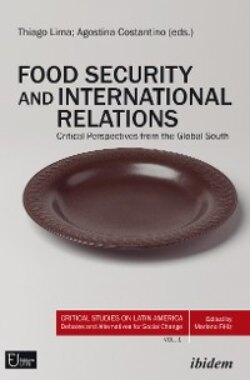Оглавление
Группа авторов. Food Security and International Relations
CHAPTER 1—INTRODUCTION. Food, Human Security and International Relations: Relations of Humanity?
1 Introduction
2 Human Security: people first
3 Food: threat, right and food sovereignty
4 Agrifood relations: from a local to global capitalist system
References
CHAPTER 2. Contours of Food Security Challenges in Neo-liberal India
Introduction:
Food Security Situation in India:
Neoliberalism and Its Impact on Food Security
A. Export Orientation
B. Open Market Sale of Public Food Stock
C. Unemployment and Migration of Workers
D. The Rise in Landlessness and Asset Inequality:
E. Withdrawal of Support to Agriculture
Concluding Remarks
References:
CHAPTER 3. Legal Dimension of the Human Right to Adequate Food and Public Policies
1 Introduction
2 The concept of the right to adequate food within the multiple dimensions of human rights
3 Public policies and the human right to adequate food
4 Final considerations
References
CHAPTER 4. Brazil and the Diplomacy to Fight Against Hunger and Poverty
1 Introduction
2 Analytical model
3 The fight against hunger and poverty: domestic dimension
4 Domestic dimension and foreign policy
5 Diplomacy to fight against hunger and poverty: multilateral dimension
6 Diplomacy to fight against hunger and poverty: regional dimension
7 Diplomacy to fight against hunger and poverty: bilateral dimension
8 Final considerations
References
CHAPTER 5. Practicing the Principles of South-South Cooperation: The Methodology of the Centre of Excellence Against Hunger
1 Introduction1
2 Guidelines for South-South cooperation
3 Guiding instruments and stages of the Centre’s activities3
3.1 Request for partnership and the Centre’s visit to the requesting country
3.2 Visit to Brazil by the requesting country and multisectoralism
3.3 Upon return to the implementation site, the challenge of sustainability
3.4 Multilateral action to encourage networks of cooperation
3.5 Beyond aid, the creation of rights
4 Conclusion: new paradigms for South-South cooperation?
Interviews
References
CHAPTER 6. Maize and the World Market: a History of Racism, Commodification, and Resistance
Introduction
1 Maize as a world commodity
2 The Maize Colonization: from racism to flex crop
2.1 Conquest, racism, and silent expansion
2.2 Commodification and re-functionalization
3 Resistance: the obstinacy of a plant of civilization
3.1 Windows of resistance in Latin America
3.2 Windows of resistance in Africa
Finalconsiderations
References
CHAPTER 7. International Food Aid and Genetically Modified Organisms: the Case of the United States
1 Introduction1
2 Food aid containing GMOs
3 GM food and some of its controversies
4 Motives of the US
5 The spread of GMOs by international regimes
6 Final considerations
References
CHAPTER 8. From Food Insecurity to Food Dependence: Pattern of Land Accumulation and Land Grabbing in Argentina
1 Introduction
2 The food situation in Argentina
3 The pattern of accumulation and food security
4 Land grabbing and food sovereignty
4.1 Primary production for the market
4.2 Conservation and tourism
4.3 Guaranteeing the supply of raw materials for their countries of origin
5 Final comments
References
CHAPTER 9. China’s Food Security and Land Grabbing. The Case of Argentina
Introduction
Land grabbing and food security
Challenges for China’s food security
Land investments strategy
China’s land grabbing in Argentina
The agri-food project of Beidahuang Group
La Paz-Estacas aqueduct and the irrigation in Mansoví Chico
Conclusion
References
